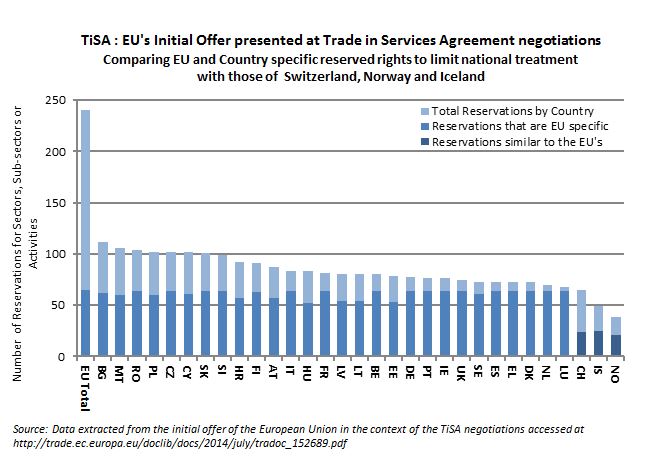Why the European Commission is unlikely to negotiate service trade agreements: An illustration
Civitas, 22 June 2016
By Michael Burrage
The European Commission’s record of negotiating service trade agreements has been particularly poor when compared with that of independent countries. In 2014 it had in force agreements, excluding those of the EU itself and with EFTA countries, which covered markets receiving just 1.85 per cent of the total UK world services exports.
The publication of the opening EU ‘offer’ in the TiSA (Trade in Services Agreement) negotiations in 2013 illustrates the difficulties it faces, and suggests that the UK would be far more effective if it were to negotiate its own agreements.
The TiSA negotiations are intended to set global rules for services trade, and improve market access in the 23 countries participating in the talks. These are being conducted under WTO auspices in Geneva, and include Hong Kong, Norway, New Zealand, and Israel among other small countries as well as Japan and the United States, though not India. China is expected to join them shortly. The UK is represented by the European Commission and has no independent participation.
The opening EU offer begins with 38 dense pages setting out the ‘reserved rights’ of individual EU countries as well as those of the EU as a whole which are common, more or less, to all members. Some of these reserved rights restrict fellow members as much as non-members, (the notable exceptions being nationality and educational qualifications) and demonstrate that potential partners are not in fact offered access to a uniform Single Market in Services of 500 million people.
In the chart shown, the reserved rights of each country consist of the EU conditions they have in common (which are not entirely uniform since members also have reservations about some of them), and on top of these, their so-called national reserved rights or conditions. On many occasions, of course, groups of EU countries reserve the same or similar rights, but at the end of the day all 28 members have their own unique profile of national conditions.
The reserved rights of the three European non-EU members have been added to the chart for illustrative purposes. Theirs are all of course all national reserved rights, though for the sake of comparison those that are roughly similar to the EU exemptions are distinguished from their more distinctive national reservations, even when they are not exact equivalents. The data from which this is drawn charts the profiles of the 28 members, and three non-members, on each of 140 types of service.

The UK is, it may be seen, among those with rather few national exemptions; four relate to health and social services, three to professional services, and one each to business, energy and distribution. However, the three non-EU members have even fewer, which indicates the advantages of negotiating as an independent country.
The EU profile on the extreme left of the chart, shows the number of reserved rights which the European Commission negotiator presents to the potential partner countries, and includes the common EU conditions with all the services to which one or more member countries has asserted a reserved right. It is a striking visual demonstration of the difficulties of speaking on behalf of 500 million people. It also suggests that any negotiations in which the EU is involved will be not only difficult but extremely time-consuming.
If and when an agreement with the EU emerges, the chances are that it will look like a Baedeker guide with specific qualifications for each of the member countries and not quite the Single Market as advertised. The agreement reached with Mexico in 2001 gives a rough idea of what to expect, though it includes only a very small proportion of the services discussed in the TiSA talks. In an annex, it then lists 85 national reserved rights, only two of which were made by the UK.
Messrs Blair, Cameron, the CBI and many multinational companies, have confidently claimed that British exporters have gained by the UK surrendering the right to negotiate trade agreements, and that the livelihoods of the British people, have been wisely entrusted to the EU, because of the ‘heft’, ‘clout’ or ‘negotiating muscle’ obtained by negotiating for 28 countries.
On balance, this chart suggests that whatever might have been gained is more than offset by the time and complexity of negotiating simultaneously for 28 countries. The poor record of the European Commission in negotiating service trade agreements strongly confirms this conclusion.
Michael Burrage is the author of Myth and Paradox of the Single Market and The Eurosceptic’s Handbook
